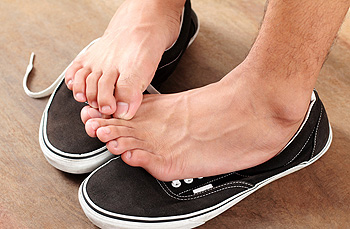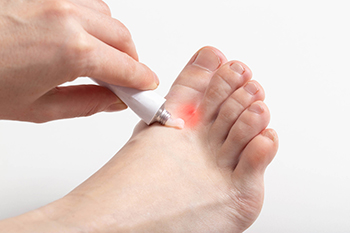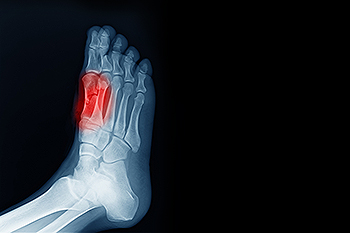Blog
Bacteria Can Cause Foot Odor

The feet have a total of 250,000 sweat glands. This vast collection can produce about a cup of sweat each day, more per square inch than any other body part. The feet contain eccrine sweat glands, which are designed to cool down the body. These consist mostly of salt and water and do not produce foot odor. Bacteria, which thrives in moist, warm environments such as sweaty feet enclosed in socks and shoes, does produce foul odors. Many types of bacteria live on the feet and interact with the sweat produced. Through a complex process involving the bacteria, the sweat glands, and the byproducts of those glands, foot odor is produced. The type of odor depends on which type of bacteria is present and thriving. Fortunately, there are a number of remedies and lifestyle changes available that can reduce the problem of extreme foot odor. For more information on how to handle this annoying problem, please consult a podiatrist.
Everyday foot care is very important to prevent infection and other foot ailments. If you need your feet checked, contact one of our podiatrists from Pennsylvania. Our doctors can provide the care you need to keep you pain-free and on your feet.
Everyday Foot Care
Often, people take care of their bodies, face and hair more so than they do for their feet. But the feet are a very important aspect of our bodies, and one that we should pay more attention to. Without our feet, we would not be able to perform most daily tasks.
It is best to check your feet regularly to make sure there are no new bruises or cuts that you may not have noticed before. For dry feet, moisturizer can easily be a remedy and can be applied as often as necessary to the affected areas. Wearing shoes that fit well can also help you maintain good foot health, as well as making it easier to walk and do daily activities without the stress or pain of ill-fitting shoes, high heels, or even flip flops. Wearing clean socks with closed shoes is important to ensure that sweat and bacteria do not accumulate within the shoe. Clean socks help to prevent Athlete’s foot, fungi problems, bad odors, and can absorb sweat.
If you have any questions please feel free to contact one of our offices located in Plymouth Meeting and Ambler, PA . We offer the newest diagnostic and treatment technologies for all your foot and ankle needs.
Dealing With Athlete’s Foot

Tinea is a fungus that feeds on skin, hair, and nails. Many people are familiar with athlete’s foot, also called tinea pedis. This fungal infection grows in the moist skin between the toes. Symptoms include redness, itching, and scaly or oozing skin. Athlete’s foot is highly contagious, often contracted by walking barefoot on wet floors in public showers, gym locker rooms, or swimming pool areas. In some cases, it can spread to the toenails, termed tinea unguium. This results in nails that are thick and crumbling. Be careful not to touch the infected areas of your feet, because the fungus can be easily spread to the hands, face, and other body parts. Athlete’s foot can be treated with a variety of lotions, creams, and medications. Prevention, however, is the best cure. Wear protective foot coverings in places where tinea thrives, and avoid sharing towels, foot coverings, or socks with others. Dry your feet thoroughly, especially between the toes, and wear different pairs of socks each day. For relief from a stubborn case of athletes’ foot, please see a podiatrist who can prescribe stronger antifungal medications.
Athlete’s Foot
Athlete’s foot is often an uncomfortable condition to experience. Thankfully, podiatrists specialize in treating athlete’s foot and offer the best treatment options. If you have any questions about athlete’s foot, consult with one of our podiatrists from Pennsylvania. Our doctors will assess your condition and provide you with quality treatment.
What Is Athlete’s Foot?
Tinea pedis, more commonly known as athlete’s foot, is a non-serious and common fungal infection of the foot. Athlete’s foot is contagious and can be contracted by touching someone who has it or infected surfaces. The most common places contaminated by it are public showers, locker rooms, and swimming pools. Once contracted, it grows on feet that are left inside moist, dark, and warm shoes and socks.
Prevention
The most effective ways to prevent athlete’s foot include:
- Thoroughly washing and drying feet
- Avoid going barefoot in locker rooms and public showers
- Using shower shoes in public showers
- Wearing socks that allow the feet to breathe
- Changing socks and shoes frequently if you sweat a lot
Symptoms
Athlete’s foot initially occurs as a rash between the toes. However, if left undiagnosed, it can spread to the sides and bottom of the feet, toenails, and if touched by hand, the hands themselves. Symptoms include:
- Redness
- Burning
- Itching
- Scaly and peeling skin
Diagnosis and Treatment
Diagnosis is quick and easy. Skin samples will be taken and either viewed under a microscope or sent to a lab for testing. Sometimes, a podiatrist can diagnose it based on simply looking at it. Once confirmed, treatment options include oral and topical antifungal medications.
If you have any questions, please feel free to contact one of our offices located in Plymouth Meeting and Ambler, PA . We offer the newest diagnostic and treatment technologies for all your foot care needs.
Signs and Solutions for Sesamoiditis

Two tiny bones in the feet located just below the big toe are called the sesamoid bones. The sesamoid bones are at work each time you walk or run, providing leverage to the big toe. When these bones, which are held in place by tendons or embedded in muscle, become irritated, the result is an inflammatory condition known as sesamoiditis. It is considered an overuse injury. People who spend a lot of time on their feet for work, sports, or high-impact activities often incur sesamoiditis. In addition, people with flat feet or high arches may experience this inflammation. Symptoms generally do not emerge suddenly, but instead, develop over a period of time. You may feel intermittent pain in the big toe, notice swelling or bruising in the area, or experience a decrease in the normal functioning of the big toe. Resting the foot often is a good idea, and wearing orthotics in the shoes is another. For more information on how to deal with sesamoiditis, including being fitted for custom orthotics, please consult a podiatrist.
Sesamoiditis is an unpleasant foot condition characterized by pain in the balls of the feet. If you think you’re struggling with sesamoiditis, contact one of our podiatrists of Pennsylvania. Our doctors will treat your condition thoroughly and effectively.
Sesamoiditis
Sesamoiditis is a condition of the foot that affects the ball of the foot. It is more common in younger people than it is in older people. It can also occur with people who have begun a new exercise program, since their bodies are adjusting to the new physical regimen. Pain may also be caused by the inflammation of tendons surrounding the bones. It is important to seek treatment in its early stages because if you ignore the pain, this condition can lead to more serious problems such as severe irritation and bone fractures.
Causes of Sesamoiditis
- Sudden increase in activity
- Increase in physically strenuous movement without a proper warm up or build up
- Foot structure: those who have smaller, bonier feet or those with a high arch may be more susceptible
Treatment for sesamoiditis is non-invasive and simple. Doctors may recommend a strict rest period where the patient forgoes most physical activity. This will help give the patient time to heal their feet through limited activity. For serious cases, it is best to speak with your doctor to determine a treatment option that will help your specific needs.
If you have any questions please feel free to contact one of our offices located in Plymouth Meeting and Ambler, PA . We offer the newest diagnostic and treatment technologies for all your foot and ankle needs.

